- Home
- Nicholson Baker
The Anthologist Page 2
The Anthologist Read online
Page 2
But notice there that Kipling’s second and fourth lines have a rest. A rest on the fourth beat. Listen for the booms now.
And here’s kind of a curious historical fact. Nobody, for years and years and years, centuries even, was able to say that poetry had those obvious booms. Nobody paid attention to the rests. Well, not nobody. There was a poet named Sidney Lanier, a flute player who was dying of consumption. He gave some lectures at Johns Hopkins on the musical basis of verse, but he had a fever, and he would get tired out and have to sit beside the podium and cough horribly and catch his breath and then continue—and his way of scoring rhythms was unfortunately wrong and only added further confusion. But he did understand that poems could have rests at the ends of lines.
Besides Lanier there was really nobody of any significance talking about rests in the straightforward musical sense of a place where you tap your toe without speaking. Poets had to be hearing these rests in their heads, because they wrote a million poems with them, poems of great comeliness that you can prance around to—but they didn’t know that’s what they were doing.
Finally came Derek Attridge, a man with a sensitive ear who taught at Rutgers. In 1982 he introduced the idea of what he called “unrealized beats” or “virtual beats.” Quote unquote. In other words, rests. They’re rests. How hard is that?
I almost had forgotten (rest)
That words were made for rhyme: (rest)
And yet how well I knew it— (rest)
Once upon a time! (rest)
That’s Christopher Morley. A light verser. Four beats in the line, the fourth beat being a rest. I hope you can hear it.
A good way you can scan something, by the way, is by saying it softly to yourself while counting with your fingers. Don’t look at the line. Memorize the line and look away from it and say it to yourself. Start with all your fingers in the air, and when you hear a beat, bring down your thumb, then your index finger, then the next finger, then the next. “I almost had forgotten, rest.” Like that. That’s how to do scansion like a pro. I don’t recommend the accent marks that some people use over syllables—they look so pedagogical. If you want to mark a line, use underlines.
Anyway, that pattern, the four lines together, four beats for each line—sometimes with rests and sometimes without rests, sometimes with a longer third line that has a stretched-out ending that leads you right in to the last line and sometimes not—that pattern makes up what’s called the common stanza or the ballad stanza, which is really the basis of English poetry. It was for Walter Scott, Wordsworth, Coleridge, Poe, Tennyson, Longfellow, all the way through to Yeats, Frost, Teasdale, Auden, Causley, Walter de la Mare, and James Fenton. Four beats is the key.
And within each beat there are subsystems of movement, duplets and triplets, waiting and breathing and sliding. It’s— well, there’s a lot more to be said. But we’ll get to that farther on down the line.
I WENT TO BUY a tablecloth to replace the one that Roz took when she left, so that I could wash it and hang it out on the clothesline. That way if she happened to drive by she might see it hanging there.
Inside the store many women were slowly moving sideways, looking at the glassware and the placemats and the bowls. There must have been thirty women in the store, and one couple in their seventies. I moved past the couple, who were looking at a square white serving bowl with a lid. “It would be nice for soup,” said the man. “Yes, true, for soup,” said the woman. The man said: “Or for stew, a big country stew.” And the woman said: “Yes, true, for stew.” And he said, “So what do you think?” And she said, “Well, it’s square. I think perhaps we should get the round one, and if they don’t want it they can return it.”
Finally I came to the tablecloths. There was one with a faint green viney pattern that looked like something that Roz would have possibly bought, so I grabbed it. It was heavy in my hand, and it pushed my fingernails into the soft parts of my fingertips as I held it out to the woman at the register.
When I got home I put the tablecloth on the table and had a late lunch/early dinner. I spilled some red sauce on the tablecloth, which I was happy about because I could wash it right away. I put in a load—the tablecloth, a pair of pants, a shirt, a towel, and two T-shirts, saving the underwear for another time—but by the time the load was done spinning the day was done, as Longfellow would say, and it was raining and the clothesline was swinging in the wind, so I couldn’t hang anything up on it. I had to use the noisy dryer.
2
IT’S HARD TO HOLD IT all in your head. All the different possible ways that you can enjoy life. Or not enjoy life. And all the things that are going on. The different rug patterns. The different car designs. The different radio shows that are coming and going. The new ads. The new crop of famous people.
And then there is, of course, always, and inevitably, this spume of poetry that’s just blowing out of the sulphurous flue-holes of the earth. Just masses of poetry. It’s unstoppable, it’s uncorkable. There’s no way to make it end.
If we could just—just stop. For one year. If everybody could stop publishing their poems. No more. Stop it. Just— everyone. Every poet. Just stop.
But of course that’s totally unfair to the poets who are just starting out. This may be their “wunderjahr.” This may be the year that they really find their voice. And I’m telling them to stop? No, that wouldn’t do.
But wouldn’t it be great? To have a moment to regroup and understand? Everybody would ask, Okie doke, what new poems am I going to read today? Sorry: none. There are no new poems. And so you’re thrown back onto what’s already there, and you look at what’s on your own shelves, that you bought maybe eight years ago, and you think, Have I really looked at this book? This book might have something to it. And it’s there, it’s been waiting and waiting. Without any demonstration or clamor. No squeaky wheel. It’s just been waiting.
If everybody was silent for a year—if we could just stop this endless forward stumbling progress—wouldn’t we all be better people? I think probably so. I think that the lack of poetry, the absence of poetry, the yearning to have something new, would be the best thing that could happen to our art. No poems for a solid year. Maybe two.
FOR INSTANCE: here’s a recent New Yorker. Actually, no—it was published almost six years ago. I got it from my pile. Pretty cover, as always. Or almost always. There have been some lapses, yes.
But this is what I mean. You lift it, you hold it, you flap it. And week after week, year after year, you hold it, you flap it. And say you open it up and flip through looking for the two new poems, and no: there would be no poem on page sixty-seven. And no poem on page eighty-three. They just simply wouldn’t be there.
Let’s have a look at this poem. Here it is, going down. You can tell it’s a poem because it’s swimming in a little gel pack of white space. That shows that it’s a poem. All the typography on all sides has drawn back. The words are making room, they’re saying, Rumble, rumble, stand back now, this is going to be good. Here the magician will do his thing. Here’s the guy who’s going to eat razor blades. Or pour gasoline in his mouth and spout it out. Or lie on a bed of broken glass. So, stand back, you crowded onlookers of prose. This is not prose. This is the blank white playing field of Eton.
And you can read it for yourself on page sixty-seven. Of this New Yorker. Alice Quinn. The magnificent Alice. This was back in the day, when Alice was the poetry editor. God bless that hardworking cheerful nice woman. She left recently and now it’s Paul Muldoon, and I hardly know Paul Muldoon. And really I hardly knew Alice Quinn, to be honest. But at least she actually accepted some of my own poems. Thank you, Alice! And rejected some of them—damn her! Things that just hurt me to have them come back saying, This isn’t for us. This one didn’t quite work for us, but we’re glad to have something from you.
“We’re glad.” The crafting of these kind no-thank-you letters. I assume Paul Muldoon will do it well, too. The really good editors have the gift. And they hurt so ba
d when they’re nice. You get a turndown and then you flip through the magazine and you say, Why? Why did Alice accept this firkin of flaccidness here on page 114 and not one of my poems? Why?
I should probably send Paul Muldoon a poem. One of my flying spoon series, none of which I’ve finished yet. Some of Muldoon’s poems actually rhyme, but not audibly. He’s cagey that way. He teaches at Princeton. He’s probably there right now, talking to students. “Hello, poetry students, I’m Mr. Paul Muldoon.” He’s a little older than I am, but not much. Oh, but the idea of starting all over again. I can hardly face it. “Dear Paul Muldoon. Glad you’re on the case now at The New Yorker. We met briefly at that poetry wingding at the 92nd Street Y a few tulip bubbles ago. Here are some fresh squibs, I hope you like them. ‘My feaste of joy is but a dish of payne,’ as the condemned man said before he was publicly disemboweled. All the very best, Paul.”
It’s scary to think. Of course I’d kind of stopped sending things to The New Yorker even before Alice Quinn left. That’s part of my problem, I think, is that I’d stopped already. And Paul will send them back, and he’ll say, Great to have something from you, but these seemed a little.… And then he’ll have some apt adjective—“underweathered,” or “overfurnished.” “Elliptically trained.” And I’ll flip through the newest issue, walking back from my blue mailbox, hunting for the poem he chose over mine, and it’ll be the same thing as always. The prose will have pulled back, and the poem will be there, cavorting, saying, I’m a poem, I’m a poem. No, you’re not! You’re an imposter, you’re a toy train of pretend stanzas of chopped garbage. Just like my poem was.
HERE’S THE THING. I am basically willing to do anything. I’m basically willing to do anything to come up with a really good poem. I want to do that. That’s my goal in life. And it hasn’t happened. I’ve waited patiently. Sometimes I’ve waited impatiently. Sometimes I’ve “striven.” I’ve made some acceptable poems—poems that have been accepted in a literal sense. But not one single really good poem.
When I look at the lives of the poets, I understand what’s wrong with me. They were willing to make the sacrifices that I’m not willing to make. They were so tortured, so messed up.
I’m only a little messed up. I’m tortured to the point where I don’t sleep very well sometimes, and I don’t answer mail as I should. Sometimes I feel a languor of spirit when I get an email asking me to do something. Also, I’ve run up a significant credit-card debt. But that’s not real self-torture. I mean, if you stand back from my life just a little—maybe thirty-five yards—I am a completely conventional person. I drive mostly within the fog lines. My life is seldom in crisis. It feels like a crisis now because Roz, who has lived with me for eight years, has moved away and left me, and I’m in considerable pain, but this little crisis of mine does not resemble the crises that Ted Roethke or Louise Bogan went through, or James Wright, or Tennyson, or Elizabeth Barrett Browning, with her laudanum. Or Poe.
One time, I remember, I was in a laundromat. It was a laundromat in Marseilles, France. “Marseilles.” Do you hear that? It’s a mattress of a word, with a lot of spring to it. “Marseilles.” I was in there, doing my laundry, and I look over, and there’s this guy there, this little guy. He was kind of pale, pasty looking. But moving with a methodical grace. And I said, Ed? And he looked up slowly. He nodded, cavernously. I said, Ed Poe? And he said, Mm-hm. And then he peered closely at me. He said, Paul? Paul Chowder? And I said, Yes, Ed! How are you doing? Been a long time. He nodded. I said, I see you’re folding some underpants there.
He said, Yes, I am. Doing my laundry. You?
I said I’m doing my laundry, too. And I mean, if you’re going to do your laundry, this place is probably as good as or better than any place I can think of. Marseilles, France. Or “Fronce,” as we say.
And I said, Can I venture to ask how the poetry’s going?
He said, It’s going pretty well, pretty well. I wrote a poem, and I got paid for it, and it was in the newspaper.
And I said, That’s fantastic. What’s it called?
And he said, It’s called “The Raven.”
I said, Holy shit, Ed, “The Raven.” Great title. What’s it about?
And he said, It’s about a man who has a visit from a raven.
And I said, That sounds really promising. What does the raven stand for? Death and fate and horror and government wiretapping and stuff like that? And he just looked at me. He wasn’t about to explicate his poem for me. Which I understand. And I said, Well, listen, take care. I grabbed my bag of laundry. I said, It’s been great seeing you. Stay happy. And he said, You too, it’s good seeing you. We waved again. Take care, bye-bye. Watch out for the big swinging blade. And I walked out the door of the laundromat. Off down the street. And that was the time that I ran into Edgar Allan Poe.
GOD I WISH I was a canoe. Either that or some kind of tree tumor that could be made into a zebra bowl but isn’t because I’m still on the tree.
It’s late in the afternoon, and the bats are getting ready to go flying for bugs. Leigh Hunt has a poem about how this girl, Jenny, jumped from her chair and kissed him. I’m thinking of how difficult it is to look old poets in the eye. Their eyelids, which droop and have skin tags on them, like tiny pennants age has hoisted, fill me with a strange consternation. And I know that the old poets themselves are self-conscious—they’re worried that people will see these two blinky pink openings in their face and think, Ugh, those look like flesh wounds with eyeballs tossed loosely into them.
I know that when my eyes get old and skin-taggy I’m going to be very happy to have glasses to hide behind.
Even now I have trouble looking people in the eye. You’re supposed to “meet people’s eyes.” Meet them how? They have two eyes. You have to choose one. I start by looking at the person’s right eye, intently, and then I begin to feel that I’m hurting the feelings of the person’s left eye. As she’s telling her story, she thinks, Why is he concentrating his attentions so fixedly on my right eye? Is he deliberately looking away from my left eye? Is there something wrong with my left eye? So then I shift over, and I stare into her left eye, till it’s as if I’m falling down an optical pipe.
My eyes have to skip away, eventually. And when I’m asked a question I look out the window. People assume that I’m failing some kind of test of candor when I’m just not an eye-meeter, that’s all. I’m just not going to meet your eye for any extended period. Period.
HOW ARE THOSE POETRY exercises coming? Did you do that thing I mentioned where you write down every real story somebody tells you or that you overhear in a twenty-four-hour period? Did I mention that exercise? Maybe not. I don’t mean the stories that come to you on electric screens or through car loudspeakers but the ones from right around you. I overheard a story at the bank yesterday about a car-repair place that overcharged. And then somebody told me a story about a dog who ate a sock. The vet couldn’t “shift it,” so he removed the sock surgically and now the dog is doing well. And there were other stories, too. If you listen to them, the stories and fragments of stories you hear can sometimes slide right into your poem and twirl around in it. Then later you cut out the story and the poem has a mysterious feeling of charged emptiness, like the dog after the operation.
I’m not going to get all maudlin about why Roz moved on. She moved on, period. I know why. It’s because I didn’t write the introduction to my anthology. And I was morose at times with her, and I was shockingly messy. And I had irregular sleeping habits. And she was supporting us, and I was nine years older than she was. And I didn’t want to walk the dog as much as I should have. And I got farty when we had Caesar salads. And I do miss her. Because she was so warm and so kind to me, and she taught me so many things. I squandered her good nature. I didn’t take it seriously. I didn’t see that it was finite.
ROZ TOLD ME, Just go up in the barn and write it. Referring to the introduction to my forthcoming poetry anthology, Only Rhyme. She said, Just go! Just go up there and wri
te it! You want to write it. Your editor wants you to write it. I want you to write it. Write it!
I said I couldn’t write it, it was too awful, too huge, it was like staring at death.
She said, Well, then write a flying spoon poem. Go up there and write something. You’ll feel better if you do.
She was right, of course. So I went up to the barn. The second floor is empty and has very few windows. It smells like I imagine the inside of an old lute would smell. I brought up my white plastic chair, and I took notes, and I read, and I thought, and I took more notes, and I sang songs. It was a beautiful week in very early summer, and I felt as if I was sitting inside John Dowland’s old lute. I sang a song that Sinead O’Connor sings, “She Moved Through the Fair.” And I sang a song I wrote myself, that goes:
I’m in the barn, I’m in the bar-harn,
I’m in the barn in the afternoo-hoon.
I sang that one a lot. And I made up a new tune for Poe’s “Raven.”
But every time I actually tried to start writing the introduction, as opposed to just writing notes, I felt straightjacketed. So I went out and bought a big presentation easel, and a big pad of presentation paper, and a green Sharpie pen, and a red Sharpie pen, and a blue Sharpie pen. What I thought was that I could practice talking through the introduction as if I were teaching a class.
And in order to be relaxed at the easel, I drank a Newcastle. Also coffee, so that I’d be sharp. And still I wasn’t sufficiently relaxed, so I drank some Yukon Gold that I found in the liquor cabinet. No, not Yukon Gold, that’s a potato. Yukon Jack, a kind of Canadian liqueur. It was delicious. It added a slight Gaussian blur. And then some more coffee, so I’d still be sharp. Blurred, smeared, but sharp.

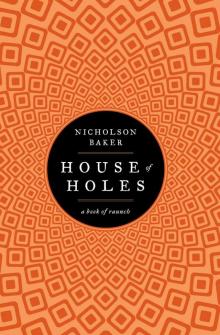 House of Holes
House of Holes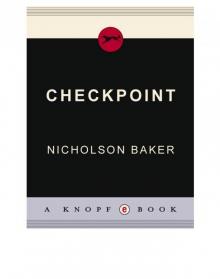 Checkpoint
Checkpoint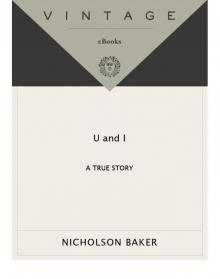 U and I
U and I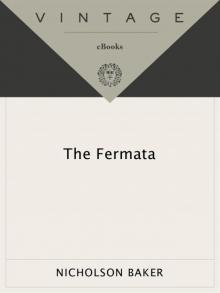 The Fermata
The Fermata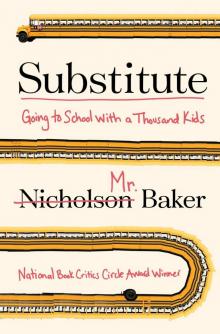 Substitute
Substitute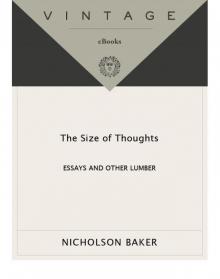 The Size of Thoughts
The Size of Thoughts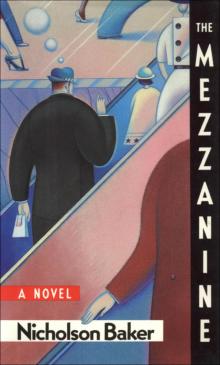 Mezzanine
Mezzanine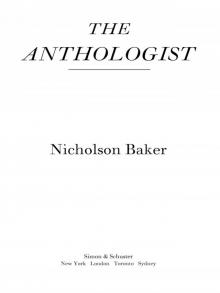 The Anthologist
The Anthologist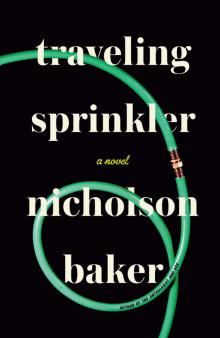 Traveling Sprinkler
Traveling Sprinkler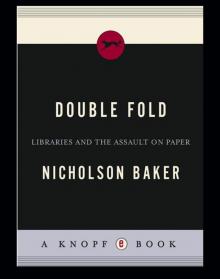 Double Fold
Double Fold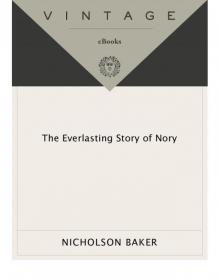 The Everlasting Story of Nory
The Everlasting Story of Nory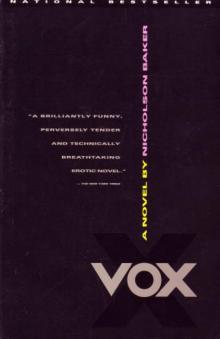 Vox
Vox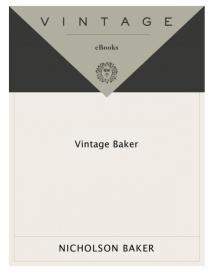 Vintage Baker
Vintage Baker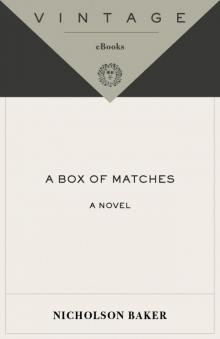 A Box of Matches
A Box of Matches